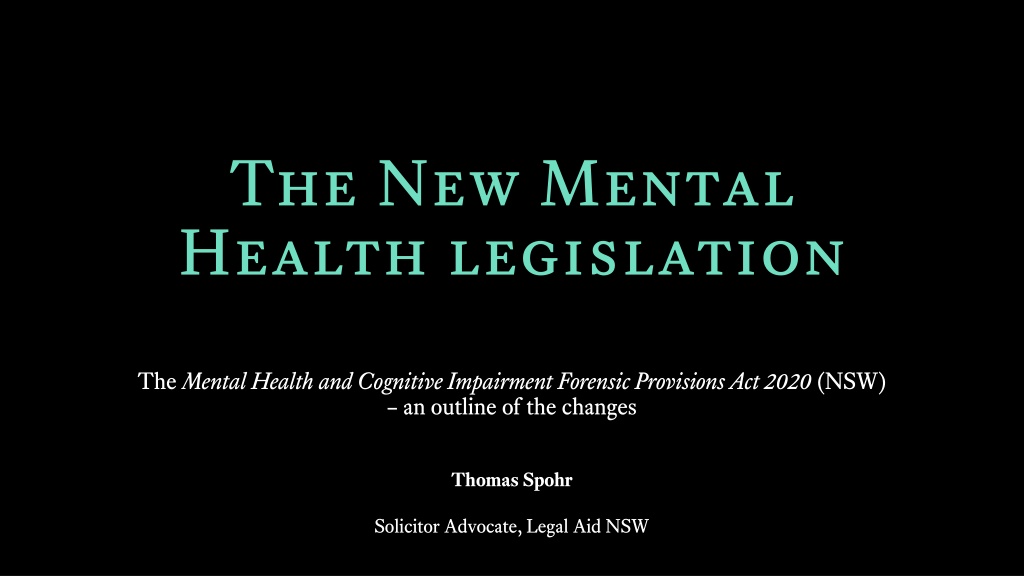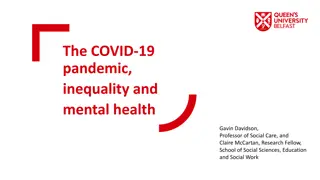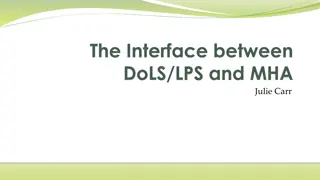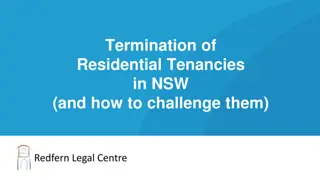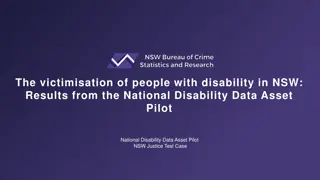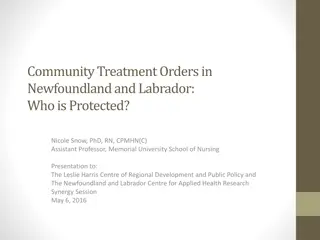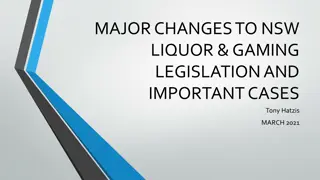Overview of the New Mental Health Legislation in NSW 2020: Changes and Implications
The Mental Health and Cognitive Impairment Forensic Provisions Act of 2020 in NSW brings about significant changes in mental health legislation. The act, outlined by Thomas Spohr from Legal Aid NSW, covers topics such as fitness, special hearings, and mental illness defense. It discusses the background leading to the act, definitions of mental health and cognitive impairment, and the impact on individuals' daily lives. The legislation reflects improvements in clarity, structure, and information codification compared to the previous common law approach.
Download Presentation

Please find below an Image/Link to download the presentation.
The content on the website is provided AS IS for your information and personal use only. It may not be sold, licensed, or shared on other websites without obtaining consent from the author. Download presentation by click this link. If you encounter any issues during the download, it is possible that the publisher has removed the file from their server.
E N D
Presentation Transcript
The New Mental Health legislation The Mental Health and Cognitive Impairment Forensic Provisions Act 2020 (NSW) an outline of the changes Thomas Spohr Solicitor Advocate, Legal Aid NSW
Introduction The structure of this bit of the presentation: Fitness Special Hearings Mental illness defence
Introduction What this bit of the presentation is, and what it isn t: Changes to the legislation Not in depth about how the various things work
Introduction There is a paper; it has been updated.
How did we get here? Or: Mummy, where do Bills come from?
How did we get here? Two NSWLRC reports: Report 135: People with cognitive and mental health impairments in the criminal justice system: Diversion (August 2012) Report 138: Criminal Responsibility and Consequences (June 2013)
How did we get here? A draft Bill in 2018 (abandoned) Lots of additional consultation
How did we get here? The result is actually pretty good Clearer English Better structure Codification of information which used to just be common law Slight improvements here and there
How did we get here? When in doubt: Go back to the NSWLRC reports (Ctrl-f) The Second Reading speech is ok.
Definitions Mental Health impairment ; and Cognitive impairment .
Definitions Cognitive impairment is defined in s 5 of the new Act. Looks very much the same as it did before but with two changes First: deleted materially affects the person s ability to function in daily life
Definitions Second: ongoing impairment to adaptive functioning has been given a special status.
Definitons Mental health impairment is a new definition. Found in s 4 and requires that the person has a temporary or ongoing disturbance of thought, mood, volition, perception or memory, and the disturbance would be regarded as significant for clinical diagnostic purposes, and the disturbance impairs the emotional wellbeing, judgment or behaviour of the person.
Definitions Non-exhaustive list of examples of mental health impairments , including anxiety disorders affective disorders including bipolar a psychotic disorder; or a substance induced mental disorder that is not temporary. Explicitly excludes temporary intoxication, and it excludes substance use disorders.
Definitions the disturbance would be regarded as significant for clinical diagnostic purposes What s that mean?
Definitions Second reading speech: significant for clinical diagnostic purposes means that the temporary or ongoing disturbance must be serious enough to result in a mental health diagnosis. Sadness, grief or anger would not suffice for the purposes of meeting the definition.
Fitness to plead Only applies to matters in the District and Supreme Courts: s 35 If you want to run unfitness in the Local Court it s still the common law test (and the common law outcome). About 30-40 people a year are referred to the MHRT following a finding of unfitness.
Fitness to plead Headline changes: Codification of the Presser test Additional question for the court: will the defendant become fit in the next 12 months?
Fitness to plead the new test R v Presser [1958] VR 45, 48 New test is (mostly) in s 36(1), with another important bit in s 44(5).
Fitness to plead the new test Section 36(1): a person is taken to be unfit to be tried for an offence if the person, because the person has a mental health impairment or cognitive impairment, or both, or for another reason, cannot do one or more of the following
Fitness to plead the new test (a) understand the offence the subject of the proceedings, (b) plead to the charge, (c) exercise the right to challenge jurors, (d) understand generally the nature of the proceedings as an inquiry into whether the person committed the offence with which the person is charged,
Fitness to plead the new test (e) follow the course of the proceedings so as to understand what is going on in a general sense, (f) understand the substantial effect of any evidence given against the person, (g) make a defence or answer to the charge,
Fitness to plead the new test (h) instruct the person s legal representative so as to mount a defence and provide the person s version of the facts to that legal representative and to the court if necessary, (i) decide what defence the person will rely on and make that decision known to the person s legal representative and the court. (2) This section does not limit the grounds on which a court may consider a person to be unfit to be tried for an offence.
Fitness to plead the new test Section 45 (5): In addition the court is to consider the following (a) whether the trial process can be modified, or assistance provided, to facilitate the defendant s understanding and effective participation in the trial, (b) the likely length and complexity of the trial, (c) whether the defendant is represented by an Australian legal practitioner, or can obtain representation by an Australian legal practitioner.
Fitness to plead the new test Still not a fantastic outcome to be found unfit There are still ethical issues
Fitness to plead Found unfit Previously: off to the Tribunal Likely to become fit in the next 12 months? Now: the court makes the decision
(a) may become fit to be tried for the offence, or (b) will not become fit to be tried for the offence. Fitness to plead Found unfit A brief mathematical interlude, caused by the wording of s 47(1): (1) If a defendant is found unfit to be tried for an offence following an inquiry, the court must also determine whether, on the balance of probabilities, during the period of 12 months after the finding of unfitness, the defendant (a) may become fit to be tried for the offence, or (b) will not become fit to be tried for the offence.
Fitness to plead Special Hearings as nearly as possible a trial Four major changes:
Fitness to plead Special Hearings If appropriate, court can modify court processes to facilitate the effective participation of the defendant (s 56(2)) If appropriate the hearing can happen without the defendant being present (s 56(8));
Fitness to plead Special Hearings If the defendant is found guilty, the court must take into account that the defendant may not be able to demonstrate mitigating factors for sentence, or make a guilty plea for the purpose of obtaining a sentencing discount. The court is also permitted to apply a discount representing part or all of the discounts for those things (s 63)
Fitness to plead Special Hearings Where the court determines that it would otherwise have imposed a sentence of imprisonment, the court simply imposes a limiting term and refers the defendant to the MHRT for treatment and supervision (ss 63(2) and 65).
The mental illness defence
The mental illness defence Headlines: Name change M Naghtentest has been codified
The mental illness defence The new statutory test applies only in the District and Supreme Courts: s 27
The mental illness defence There is a strong (probably overwhelmingly strong) argument that the common law relating to the defence of mental illness applies in the Local Court (NSWLRC have been talking about it since at least 1996).
The mental illness defence the name change Previously: Not Guilty by reason of Mental Illness (NGMI*) (*where did the R go in this??)
The mental illness defence the name change Now: act proven but not criminally responsible ( NCR )
The mental illness defence the new test Queen v M'Naghten (1843) 8 E.R. 718 Now codified s 28(1)
The mental illness defence the new test s28(1): A person is not criminally responsible for an offence if, at the time of carrying out the act constituting the offence, the person had a mental health impairment or a cognitive impairment, or both, that had the effect that the person (a) did not know the nature and quality of the act, or (b) did not know that the act was wrong (that is, the person could not reason with a moderate degree of sense and composure about whether the act, as perceived by reasonable people, was wrong).
The mental illness defence the new test No more disease of the mind Now needs to have come from either a mental health impairment or a cognitive impairment, or both.
The mental illness defence the new test Transitional provisions: raised a question ?
